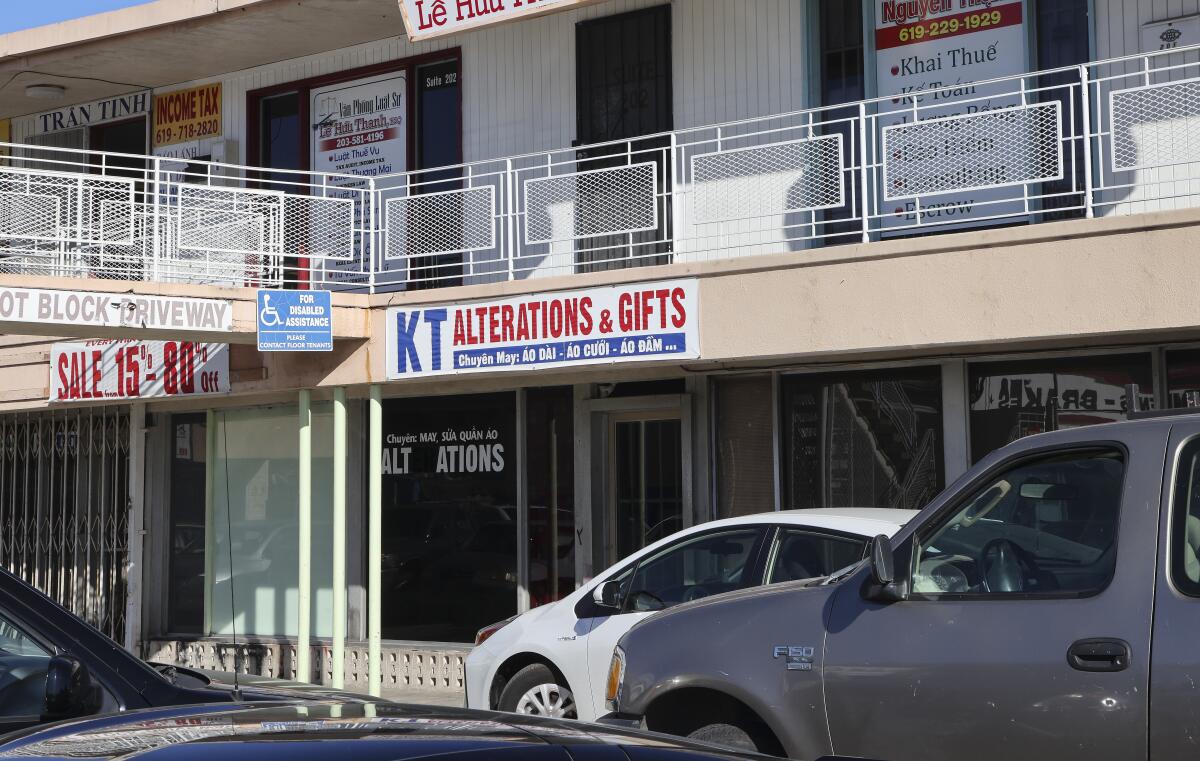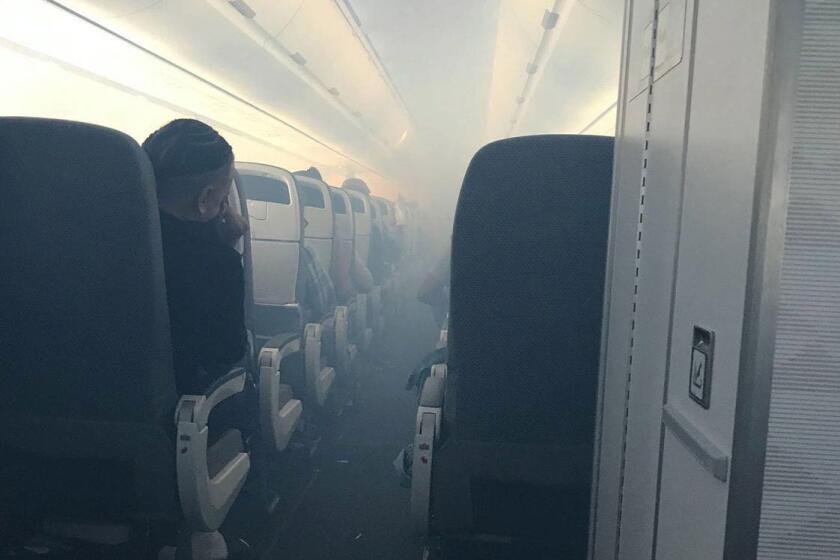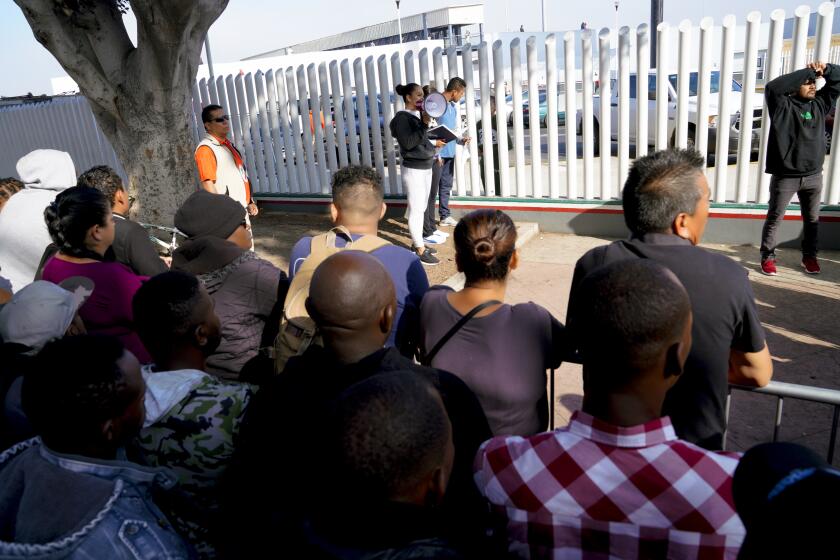San Diego’s hidden gambling problem: Illicit casinos attract gangs, drugs, violence

SAN DIEGO — Tucked in an aging strip mall next to a coffee shop and a tax preparer in central San Diego, a clothing alterations shop was running a particularly brisk business.
But expert tailoring wasn’t the draw.
A task force raid in October found evidence of an illegal gambling parlor, with 16 video gaming machines, drugs, methamphetamine pipes and about $1,700 in cash concealed in drywall, according to an FBI search warrant affidavit.
That same night, investigators busted a similar casino blocks away, operating in a unit behind a small house.
The businesses are just two examples of a much larger illicit economy that has risen in urban centers and quiet residential neighborhoods throughout California, including San Diego County.
Illegal gambling is a misdemeanor under state law. Authorities say these underground parlors operating in the region are closely tied to a more serious criminal element: gangs, drugs and violence.
Toxic fumes on airplanes. COVID-19 spreading in prisons. Long delays to see medical specialists. Catch up on our accountability reporting from 2020.
Homicide, shootings, stabbings, thefts — all have been investigated in and around the sites, according to the FBI affidavits.
Methamphetamine often goes hand-in-hand with play at many covert gaming halls and is often sold or supplied by operators on-site, according to court records. The stimulant can keep patrons in front of machines for hours in a hyper-focused and confident state. It also entices them to come back for more.
“Illegal gambling dens bring drugs, violence, guns, and other organized criminal activity into San Diego neighborhoods,” said FBI spokeswoman Davene Butler.
That violence has grown increasingly conspicuous in the last year.
Over Thanksgiving weekend, a shooting at an eastern San Diego motel revealed several gaming machines set up for business in two of the rooms.
In October, reports of a shooting drew sheriff’s deputies to a Spring Valley casino hidden in an outbuilding.
And in June, at a Paradise Hills home operating as an illegal gambling site and marijuana grow site, police found a dead man wrapped in plastic.
The law
Gambling for profit is a highly regulated industry in California and is mostly restricted to tribal casinos, card rooms, horse wagering and state lottery.
It is a misdemeanor to run or play in a game in which the “house” — a term for a casino or bookmaker — collects money from losers to pay winners or takes a percentage of bets made. The law generally allows charity games and neighborhood poker games with no house but not the kind of organized underground for-profit ventures that have drawn the attention of law enforcement.
It is also illegal in California, and many other states, to own a functioning slot machine unless it is at least 25 years old.
It’s not clear where the pop-up operations get their gaming machines, but authentic slot or video card machines appear relatively simple to buy online for $1,000 or more.
They are digital, touch screen and advertised as available for private home use — even though some print payout tickets rather than dispense cash winnings.
The San Diego County district attorney’s office and the San Diego city attorney’s office have filed 63 illegal gambling cases in the county over last five years, according to data from the county. Among the common charges were gambling and conspiracy, and most often the investigation came under the purview of vice or gang detectives.
It was in 2013 that San Diego police gang detectives began to notice a sharp increase in illegal gambling parlors, most of them run by Asian gangs in the City Heights area, according to federal search warrant affidavits. In 2015, the locations drew more attention as they became associated with rising crime.
Despite vows to crack down, the Sheriff’s Department has long been criticized for failing to rein in rogue deputy cliques that allegedly encourage violence and other forms of misconduct.
“Investigators learned that the patrons were often gang members, career criminals, habitual drug users, and fugitives,” the affidavits state.
More recently, the FBI has gotten involved, lending resources and gang intelligence to local and state authorities and opening up the possibility of federal charges, Butler said.
To be charged under the federal Illegal Gambling Business Act, the business must violate state gaming law, involve five or more people and have operated consistently for more than 30 days or gross more than $2,000 in a single day. A conviction could land a defendant a sentence of up to five years in prison.
Other charges could also come into play, depending on the extent to which organized crime or drug sales are involved, resulting in more severe penalties.
“It also enables the entire criminal enterprise to be dismantled or disrupted, instead of the prosecution of a few low-level members,” Butler said.
Inside a den
Law enforcement declined to talk about ongoing investigations, but search warrant affidavits provide a glimpse into the covert nature and hierarchal organization of what they refer to as “illegal gambling dens.”
The owners often keep their distance from the premises and instead rely on reliable lieutenants to run day-to-day operations.
Rental leases and utilities are also often in the names of people other than the owners.
Many owners employ money couriers, using them as a conduit to bankroll employees, collect funds and deliver profits to the owner. The courier is often seen as a manager who represents the owner’s interests.
Then there is the banker, who carries the bankroll, cashing in and out customers.
The doorman is usually a neighborhood guy who can screen customers and deal with disputes that may occur inside.
“Often, the doorman is a known gang member or a career criminal who has ‘respect’ in the streets to deal with unwanted patrons, attempted robberies, and law enforcement,” the affidavits state.
To keep employees honest, the owner will typically ask for an audit, often multiple times a day or when the bankroll reaches $2,000. The cash is removed from the machines, and a photo is taken of the machine’s master screen to record the cash in, cash out and net gains.
Jackpots are usually maxed out around $1,000.
The allure
About 60% of the population gambles in some way, even if it’s just buying lottery tickets, said Dr. Timothy Fong, a psychiatrist and co-director of the UCLA Gambling Studies Program.
“Gambling appeals to so many parts of human pleasure and reward — the possibility of winning, the escape, the idea I have special powers and skills over a game,” he said.
Fong has spoken with a few patrons of underground establishments, which he calls “unregulated gambling dens.” People go, he said, because they are convenient. They go for the drugs. They go for the excitement. They go because friends go. Never mind that the payout may not be great or that it’s illegal to be there.
Large parties were held New Year’s Eve and into the weekend in Los Angeles despite surging COVID-19 infections and a regional order barring such gatherings.
“Crime, drugs, games of chance that aren’t run fairly,” Fong said. “And of course that leads to financial loss and stress.”
The pandemic brings its own complications. Fong wonders whether illegal casinos could be super-spreader sites. Add to that the economic squeeze that leaves sparse cash in hand, making gambling riskier and more emotional.
“Criminals use it to make money,” Fong said. “And when you lose money and you think you have been cheated — and you are already in an unregulated casino and you shouldn’t have been there — that’s when tempers fly.”
Drawing attention
Authorities suspect a dispute over few dollars may have escalated into a slaying in a Paradise Hills home-turned-casino last June.
During hearings in San Diego County Superior Court over the summer, Deputy Dist. Atty. Michael Reilly said the 44-year-old victim, Sean Nixon, was kicked out of what Reilly called “an illegal gambling den” after Nixon tried to take a fanny pack with $30 inside.
He was allowed to return. But later that night, according to Reilly, the brothers accused of running the casino ambushed Nixon. One brother wrapped a strap around the victim’s neck, and as he was being strangled, the other brother beat and kicked him.
The following day, police went to the home and found Nixon’s body wrapped in plastic. Authorities have not said what prompted police to go to the home.
Several people have been arrested in connection with Nixon’s death. All have pleaded not guilty.
Last fall, sheriff’s deputies were called to a Helix Street home in Spring Valley to check on a reported shooting. They found 15 slot machines in an outbuilding on the property.
Human Rights First found that many people seeking asylum in the U.S. with strong cases for protection have been sent back to the harms that they fled.
One deputy stepped on a nail in a board, an apparent booby trap, according to the department. Two people were arrested in connection with the operation.
In September, the East County Regional Gang Task Force descended on a National City home, arriving with an armored truck and a search warrant. The San Diego County Sheriff’s Department said authorities confiscated at least 13 slot machines and an undisclosed amount of cash.
The October raids in City Heights were the result of an FBI task force investigation.
Investigators say patrons at KT Alterations & Gifts gambled on machines loaded with games that included poker, keno, blackjack, and slots — machines that officers later rolled out on a dolly and loaded into the back of a truck as evidence, according to video footage by Copwatch. Investigators also obtained evidence of methamphetamine use and sales at the site, according to the affidavit.
Blocks away on Euclid Avenue, the task force searched a unit behind a small home, pulling out eight gaming machines and drug paraphernalia, as well as the next-door apartment of the alleged operator, the affidavit states.
Authorities say many more operations remain under investigation.
Davis and Figueroa write for the San Diego Union-Tribune.
More to Read
Sign up for Essential California
The most important California stories and recommendations in your inbox every morning.
You may occasionally receive promotional content from the Los Angeles Times.














